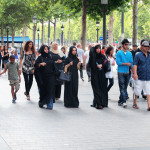The attack on “Charlie Hebdo” and the Jewish supermarket, leaving too many people dead, was an attack carried out in the name of Islam and Muhammad upon the European values of freedom of expression and religion. The concept of freedom is interpreted in a wide variety of ways in our contemporary world, and people draw different conclusions from their understanding of it. European society is united in the view that freedom is never without limits for all and sundry, which is why the courts have to set boundaries. The State safeguards freedom, but it cannot ensure that it is handled in a responsible way. One of the fundamental principles of a State is the respect for human dignity. We do not have to share another person’s feelings, but we should still respect them. It follows that we willingly impose restraints and limits on ourselves – in the same way that something that is technically possible is not automatically authorised. If European pluralistic society wants to preserve public peace, politics has no alternative but to protect the values that are sacred to the faithful (ie to Christians, Jews, Muslims and atheists alike) without identifying with them in this way or, in the words of M. Houellebecq: “A society without religion cannot survive.” (Zeit Online 21.1.2015)
Looking at Islam, today we are paying the price for the failure of Muslim scholars in keeping the Koran and Muhammad immune from being instrumentalised by Islamists. In the Koran verses can be found that relate to violence, such as the “Sword Verse” (Koran 9,5). Similar statements can also be found in the Bible. But the passages in the Old Testament do not have the same mobilising effect on Jews and Christians as Islam and the Koran have on political Muslims. The violence lurks beneath the surface and is associated to the postulate of asserting, as quickly as possible its intentions through use of force. A religion that has not answered the question of violence in unequivocal terms serves as justification.
The globalisation of media reporting is without doubt one of the reasons underpinning the Islamists’ acts of terrorism. The media display images that make clear to anybody and everybody the stark differences in social, political and economic situations throughout the world. While Europe, whose culture is largely Christian, enjoys a high standard of living and freedom of expression and religion are under the protection of democracy, most Muslims around the world are living under conditions of war, economic deprivation and political oppression by authoritarian regimes. The enemy is “the others” that prevent “Ye are the best of peoples, evolved for mankind, enjoining what is right, forbidding what is wrong, and believing in Allah.” (Koran, 3,110).
The second reason is the philosophical-theological dissonance between Islam and European thinking. No movement to remove the myths with regard to the magical-ritualistic perception of God has had any effect in the various Islamic traditions. The jihadists derive their spiritual nourishment from a naïve ‘direct connection’ to the will of God and especially to that of Muhammad. Whoever submits to the will of Allah is already in Allah’s favour and therefore can do anything he or she pleases. A God revealing himself in this way, as He Himself pleases, may correspond to the early tribal religious phase in many respects, but not to the rational understanding of God as preached by Jesus. Islam will never be able to find its way out of this impasse unless it breaks out of its prison of the historical tribal roots of religious consciousness. There is not one single passage to be found in the Koran that exacts penalties for blasphemy or pictorial representations of Muhammad. Pakistan did not introduce the criminal offence of blasphemy until the period 1980 –1986 under the military dictatorship of General Zia ul Haqq.
The aberrations of a religion cannot be shrugged off through semantic sophistry. People have tried to do this by repeating over and over that it is possible to disassociate Islamists from Islam as a whole. The differentiation between Islam and Islamism has never been wrong. It is just incomplete. The terrorists are invoking Islam to justify their actions and therefore it would make no sense to deny the religious background. The al-Azhar University clarified in December 2014 that jihadists are not “unbelievers” but their terrorist acts in the name of Islam should be condemned. Muslims must maintain their distance from those groups that interpret Islam as a political ideology.
(source: Europeinfos #179)
L’attacco con troppi morti a “Charlie Hebdo” e al supermercato ebraico è stato un attacco in nome dell’Islam e di Maometto ai valori europei della libertà di espressione e libertà di religione. Sulla libertà ci sono oggi idee molte diverse che portano a conclusioni differenti. Tuttavia la società europea è concorde sul fatto che la libertà non è mai sconfinata per nessuno, motivo per cui i tribunali devono definirne i limiti. Lo Stato tutela la libertà, ma non può sanzionare l’uso responsabile che ne viene fatto. Lo Stato ha bisogno di un’istanza che si trova ancora più a monte: il rispetto per la dignità dell’uomo. Non è un obbligo il condividere i sentimenti dell’altro, ma li si deve rispettare. Ne derivano restrizioni e auto-limitazioni, così come il principio secondo cui non tutto ciò che è tecnicamente possibile è consentito. Se la società pluralista europea vuole preservare la pace pubblica, la politica non può proteggere i valori che sono sacri per i credenti, cristiani, ebrei e musulmani e atei, senza identificarsi con loro, o secondo le parole di Michel Houellebecq: “Una società senza religione non è in grado di sopravvivere “ (Time Online 21/01/2015).
Per quanto riguarda l’Islam, si portano oggi le conseguenze del fatto che gli studiosi musulmani non sono stati in grado di immunizzare il Corano e Maometto contro la strumentalizzazione da parte degli islamisti. Nel Corano si possono trovare versi che si riferiscono alla violenza come “il versetto della spada” (Corano 9,5). Dichiarazioni simili si possono trovare anche nella Bibbia. Tuttavia, i passi dell’Antico Testamento non hanno uguale efficacia nel mobilitare gli ebrei e i cristiani come nel caso dei musulmani politici dell’Islam e del Corano. La violenza si nasconde sotto la superficie ed è collegata alla pretesa d’imporre il più velocemente possibile i propri obiettivi con la forza. Una religione che non ha chiaramente risposto alla questione della violenza viene utilizzata per giustificarla.
Una delle ragioni per le azioni terroristiche degli islamisti è certamente la globalizzazione della comunicazione multimediale. Le loro immagini mostrano con grande chiarezza in tutto il mondo la netta diversità di situazioni sociali, politiche ed economiche. Mentre l’Europa influenzata dal cristianesimo gode di un alto tenore di vita e la libertà di espressione e di religione sono protette dalla democrazia, la maggior parte dei musulmani di tutto il mondo vive in condizioni di guerra, disagio economico e oppressione politica di regimi autoritari. Il nemico è l’“Altro”, che impedisce di “ordinare il bene, proibire il male e credere in Allah” (Corano 3,110).
La seconda ragione è l’asincronia filosofica e teologica tra il pensiero islamico e quello europeo. In nessuna delle diverse tradizioni islamiche c’è stata una corrente demitizzante che abbia avuto conseguenze sulla comprensione magico-rituale di Dio. I jihadisti si nutrono spiritualmente con un’ingenua immediatezza nei confronti della volontà di Dio e dell’esempio di Maometto. Chi si sottomette ad Allah, ha già Allah, e può fare quello che vuole. Un Dio che si rivela secondo il proprio arbitrio corrisponde per diverse ragioni con una fase religiosa tribale e primitiva ma non con la comprensione razionale di Dio come Gesù ha predicato. L’Islam può trovare un modo per uscire da questa impasse solo se si libererà dalla prigionia di una consapevolezza primitiva del religioso. Non si trova un solo verso nel Corano in cui si faccia riferimento a punizioni per quanto riguarda la blasfemia o le rappresentazioni di Maometto. Il Pakistan ha introdotto il reato di blasfemia tra il 1980 e il 1986, durante la dittatura militare di Zia-ul-Haq.
Non ci si può liberare dalle aberrazioni di una religione con un inganno semantico, come si è tentato ripetendo il mantra per cui è possibile separare gli islamisti dall’Islam. La distinzione tra Islam e islamismo non è mai sbagliata, ma è incompleta. I terroristi invocano l’Islam per legittimare le proprie azioni e quindi non avrebbe senso negare lo sfondo religioso. L’Università al-Azhar ha dichiarato nel dicembre 2014, che gli jihadisti non sono “infedeli”, ma che i loro atti terroristici devono essere condannati in nome dell’Islam. I musulmani devono separarsi dai gruppi che limitano l’Islam a un’ideologia politica.
(source: Europeinfos #179; traduzione italiana a cura di Eurcom)
Les attentats requièrent une interprétation
L’attaque contre «Charlie Hebdo» et le commerce juif, qui s’est soldée par la mort d’un trop grand nombre de personnes, était une attaque menée au nom de l’islam et de son prophète Mohammed contre les valeurs européennes de la liberté d’opinion et de religion. Il existe aujourd’hui des représentations très diverses de la liberté qui aboutissent à des conclusions toutes différentes. La société européenne s’accorde à dire que la liberté de chacun n’est jamais illimitée, c’est pour cette raison que la justice doit fixer ses limites. L’État garantit la liberté, mais il ne peut sanctionner une utilisation responsable de celle-ci. L’État a besoin pour cela d’un fondement préalable: le respect de la dignité de l’être humain. Il n’y a certes pas d’obligation à partager les sentiments d’autrui, mais on devrait les respecter. Cela explique les restrictions volontaires et les limites – de la même manière que tout ce qui est techniquement possible n’est pas autorisé. Si la société pluraliste européenne veut préserver la paix civile, le politique ne peut pas éviter de protéger les valeurs qui pour les croyants, chrétiens, juifs et musulmans, ainsi que pour les athées, sont sacrées, sans s’y identifier, ou, pour le dire comme Michel Houellebecq: «Une société sans religion, (qui transmet des valeurs fondamentales,) n’est pas viable.» (Zeit Online 21.1.2015)
En ce qui concerne l’islam, on paye aujourd’hui le fait que les érudits musulmans n’ont pas été capables d’immuniser le Coran et Mohammed contre son instrumentalisation par les islamistes. On peut trouver dans le Coran des versets relatifs à la violence comme le «verset de l’épée» (Le Coran, IX.5). Des énoncés comparables se trouvent également dans la Bible. Toutefois, les passages de l’Ancien Testament n’ont pas, pour les juifs et les chrétiens, la même force de mobilisation opérante que le Coran et l’islam pour les musulmans islamistes. La violence est sous-jacente et elle est liée à la prétention d’imposer au plus vite ses desseins par la force. Une religion qui n’a pas clairement répondu à la question de la violence sert à la justifier.
La mondialisation de la couverture médiatique est assurément l’une des causes des actes terroristes des islamistes. Ils diffusent des images qui montrent à tous les différences flagrantes des conditions sociales, politiques et économiques à l’échelle mondiale. Alors que l’Europe imprégnée par le christianisme jouit d’un niveau de vie élevé et que la liberté d’opinion et de religion bénéficie de la protection de la démocratie, la plupart des musulmans dans le monde vivent dans des pays en état de guerre, dans des situations de détresse économique et sous l’oppression politique de régimes autoritaires. L’ennemi, c’est l’«autre» qui empêche que vous soyez «la meilleure communauté jamais produite aux hommes pour ordonner le convenable, proscrire le blâmable et croire en Dieu.» (Le Coran, III.110).
La seconde raison concerne le décalage temporel philosophico-théologique entre les pensées islamique et européenne. Dans les diverses traditions islamiques, aucun courant démythifiant concernant la perception magico-ritualiste de Dieu n’a été efficace. Les jihadistes se nourrissent spirituellement d’une immédiateté naïve par rapport à la volonté de Dieu et, notamment, de Mohammed. Celui qui se soumet à Allah l’a déjà gagné, et il peut faire ce qu’il veut. Un Dieu se révélant de la sorte, selon son bon vouloir, peut, à bien des égards, correspondre au stade primitif tribal religieux, mais pas à la connaissance rationnelle de Dieu que Jésus a prêché. L’islam ne pourra sortir de cette impasse qu’en se libérant des racines tribalistes de la conscience religieuse. On ne trouve dans le Coran aucun passage se rapportant à des châtiments liés au blasphème ou aux représentations figuratives de Mohammed. Le Pakistan n’a introduit le délit de blasphème qu’entre 1980 et 1986 sous la dictature militaire du général Zia-ul-Haq.
Une religion ne se libère pas de ses errements par une astuce sémantique, comme on a tenté de le faire en nous répétant à l’envie qu’il était possible de dissocier les islamistes du corps de l’islam. La différenciation entre islam et islamisme n’a jamais été incorrecte. Elle est seulement incomplète. Les terroristes se réclament de l’islam pour légitimer leurs actes et, par conséquent, il ne serait pas judicieux de nier la toile de fond religieuse. L’université al-Azhar a précisé en décembre 2014 que les jihadistes n’étaient pas des «incroyants», mais que leurs actes terroristes revendiqués au nom de l’islam devaient être condamnés. Les musulmans doivent prendre leur distance par rapport aux groupes qui restreignent l’islam à une idéologie politique.
(source: Europeinfos #179)
Attentate bedürfen einer Interpretation
Der Angriff auf „Charlie Hebdo“ und dem jüdischen Geschäft mit zu vielen Toten war ein Angriff im Namen des Islam und Muhammad auf die europäischen Werte der Meinungs- und Religionsfreiheit. Von Freiheit gibt es heutzutage ganz unterschiedliche Vorstellungen, die zu ganz unterschiedlichen Schlüssen führen. Einig ist sich die europäische Gesellschaft darin, dass eine Freiheit nie grenzenlos für jeden ist, deshalb müssen Gerichte ihre Grenzen festlegen. Der Staat sichert die Freiheit, er kann den verantwortlichen Umgang mit ihr aber nicht sanktionieren. Der Staat braucht dazu eine Instanz, die er vorfindet: den Respekt vor der Würde des Menschen. Man muss die Gefühle des anderen ja nicht teilen, sollte sie aber respektieren. Daher ergeben sich Selbstbeschränkungen und Grenzen – so wie auch nicht alles erlaubt ist, was technisch möglich ist. Will die europäische pluralistische Gesellschaft den öffentlichen Frieden bewahren, kommt die Politik nicht daran vorbei, die Werte, die den Gläubigen, Christen, Juden und Muslimen sowie den Atheisten heilig sind, zu schützen, ohne sich damit mit ihnen zu identifizieren, oder mit den Worten von Michel Houellebecq: „Eine Gesellschaft ohne Religion, (die grundlegende Werte vermittelt,) ist nicht überlebensfähig.“ (Zeit Online 21.1.2015)
Mit Blick auf den Islam rächt sich heute, dass muslimische Gelehrte es nicht vermocht haben, den Koran und Muhammad gegen die Instrumentalisierung durch Islamisten zu immunisieren. Im Koran kann man einschlägige Verse für Gewalt finden wie den „Schwertvers“ ( Koran 9,5). Ähnliche Aussagen lassen sich auch in der Bibel finden. Allerdings haben die Bibelstellen des Alten Testamentes keine ähnlich wirksame Mobilisierungswirkung für Juden und Christen wie für politische Muslime der Islam und der Koran. Gewalt lauert unter der Oberfläche und ist mit dem Anspruch verbunden, am schnellsten mit Gewalt Anliegen durchzudrücken. Zur Rechtfertigung dient eine Religion, die die Gewaltfrage nicht eindeutig beantwortet hat.
Ein Grund für die terroristischen Aktionen der Islamisten ist sicherlich die Globalisierung der medialen Berichterstattung. Sie zeigen Bilder, die jedem den krassen Unterschied der sozialen, politischen und wirtschaftlichen Situationen weltweit klar machen. Während das christlich geprägte Europa einen hohen Lebensstandard genießt, und Meinungs- und Religionsfreiheit unter dem Schutz der Demokratie stehen, leben die meisten Muslime weltweit unter den Bedingungen des Krieges, der wirtschaftlichen Not und der politischen Unterdrückung in autoritären Regimen. Der Feind ist der „Andere“, der verhindert, dass „Ihr gebietet was recht ist, verbietet, was verwerflich ist, und glaubt an Gott.“ (Koran 3,110).
Der zweite Grund ist die philosophisch-theologische Ungleichzeitigkeit zwischen dem islamischen und europäischen Denken. In den unterschiedlichen islamischen Traditionen wurde keine entmythologisierende Strömung mit Blick auf das magisch-ritualistische Gottesverständnis wirksam. Die Dschihadisten nähren sich geistig aus einer naiven Unmittelbarkeit zum Willen Gottes und zum Beispiel von Muhammad. Wer sich Allah unterwirft, hat schon Allah, und er kann tun, was er will. Ein derart sich je nach Gutdünken offenbarender Gott mag in vielerlei Hinsicht mit der frühen stammesreligiöser Phase übereinstimmen, mit dem rationalen Gottesverständnis wie Jesu ihn verkündigt hat. Der Islam kann aus dieser Sackgasse erst dann herausfinden, wenn er aus seiner stammesgeschichtlichen Gefangenschaft des religiösen Bewusstseins ausbricht. Man findet keine einschlägigen Stellen im Koran für Strafen bezüglich einer Blasphemie oder der bildlichen Darstellungen von Muhammad. Pakistan hat den Strafbestand für Blasphemie erst zwischen 1980 bis 1986 unter der Militärdiktatur Zia ul Haqq eingeführt.
Die Irrwege einer Religion lassen sich nicht abspalten durch semantischen Betrug, wie es versucht wird, wenn man gebetsmühlenartig wiederholt, es sei möglich, Islamisten vom Gesamt des Islam abzukoppeln. Die Differenzierung zwischen Islam und Islamismus war nie falsch. Sie ist aber unvollständig. Die Terroristen berufen sich auf den Islam als Legitimation ihrer Taten und deshalb wäre es nicht sinnvoll, den religiösen Hintergrund zu leugnen. Die al-Azhar Universität hat im Dezember 2014 klargestellt, dass Dschhadisten keine „Ungläubige“ sind, ihre terroristischen Handlungen im Namen des Islam aber zu verurteilen seien. Die Muslime müssen sich von den Gruppen, die den Islam in einer politischen Ideologie einengen, verabschieden.
(quelle: Europeinfos #179)
Hans Vöcking
Latest posts by Hans Vöcking (see all)
- Why are young Muslims leaving Europe to go to war? - 11 aprile 2015
- Attacks that need to be explained - 14 febbraio 2015










